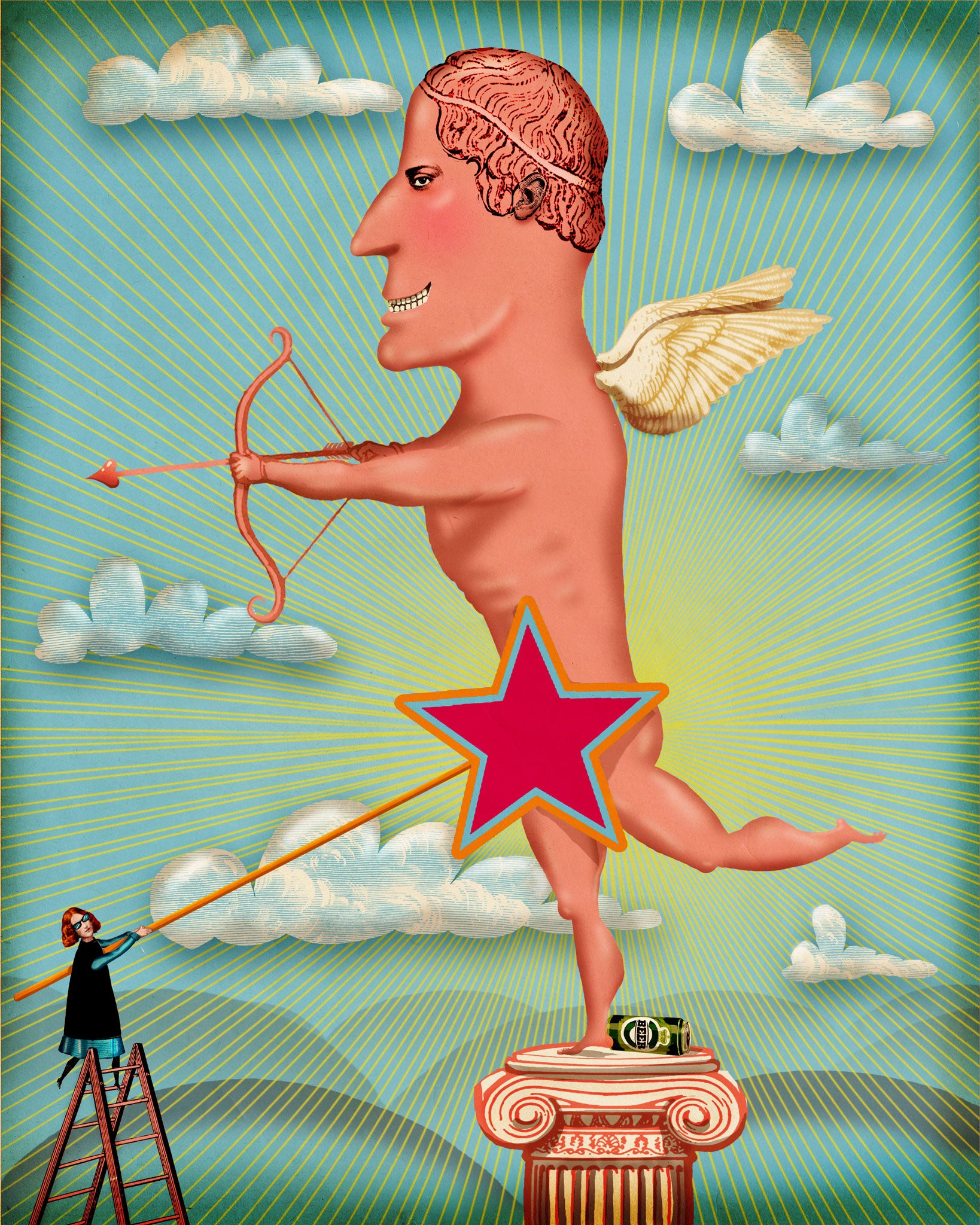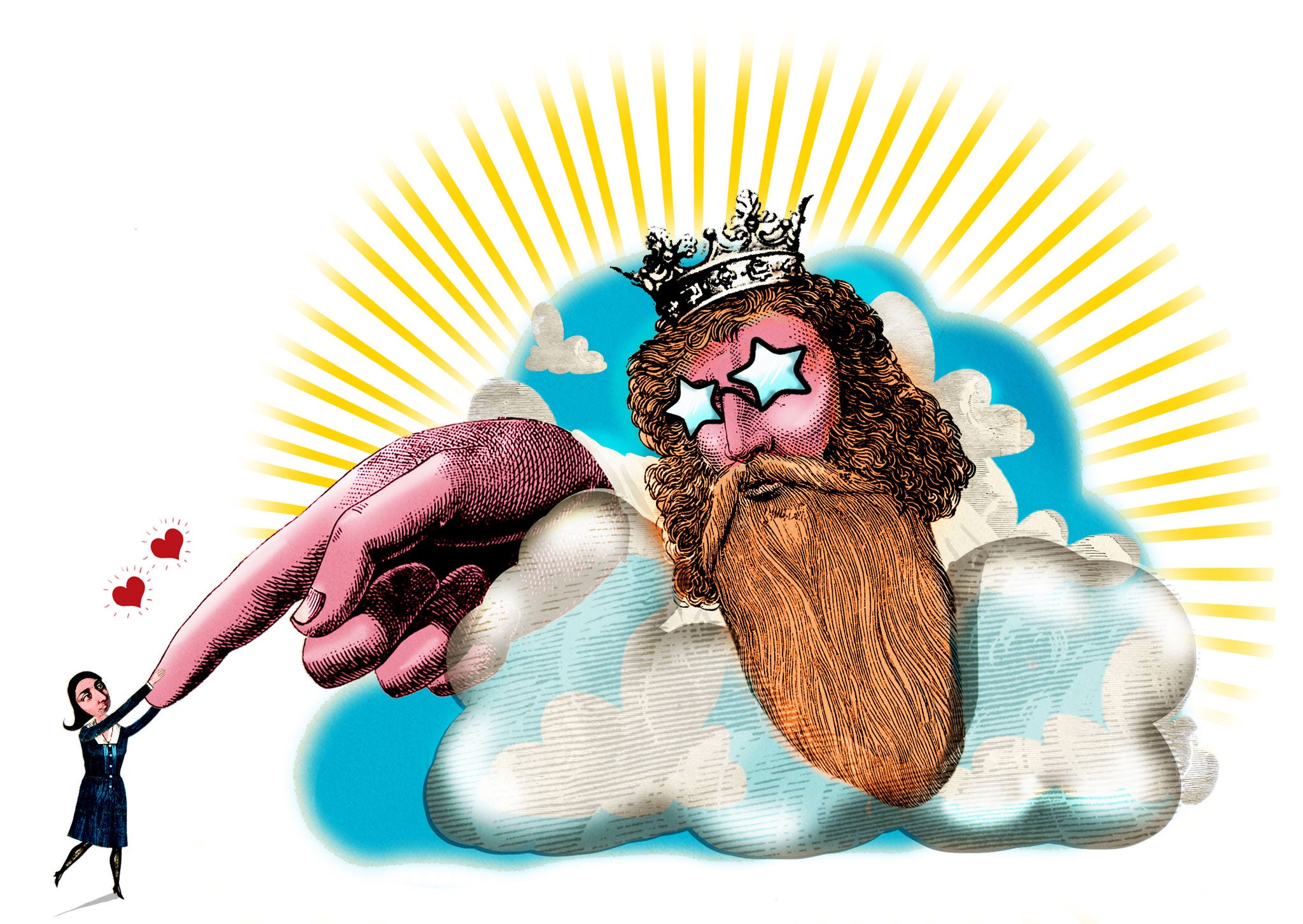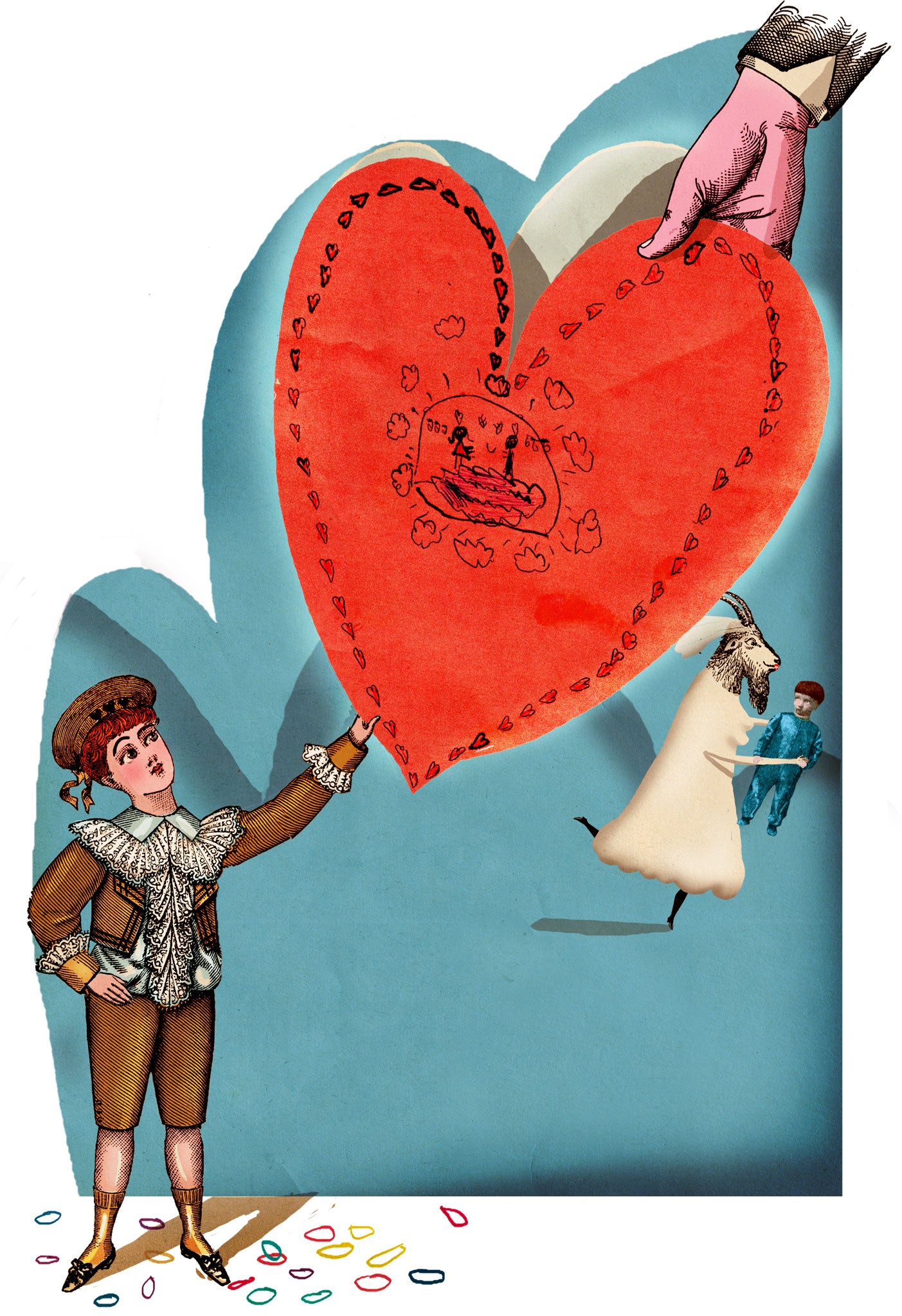Andy Zaltzman's Valentine's lessons in modern love from the Ancient Greeks
Rejoice! Or possibly despair! It's Valentine's Day. But love wasn’t always defined by overpriced set menus and cheap flowers, you know. Here, comedian - and Classics scholar - Andy Zaltzman muses on the Ancient Greeks' different words for lurrrrve

Many of the everyday fundamentals of our Western lifestyles owe a grovelling debt of gratitude to the Ancient Greeks – democracy, drama, sitcoms, organised sport, all-action blockbuster war epics, foolhardy politically-motivated military campaigns, nudey wrestling, pornographic crockery, and lying around thinking about stuff in general. All beloved activities in the Eastern Mediterranean 2,500 years ago, and all still manically popular in today's Britain. But the Greek influence on our way of life goes beyond even these, and as the sacred festival of St Valentine's is upon us once again, with all its promise of budding romance, matured affection, and stomach-crushing rejection, we should tip a furry pink hat of acknowledgement towards the Greeks' pioneering attitudes towards love.
Thinkers and artists from Plato to Howard Jones have explored the question of what 'love' is. Despite our 21st-century science and technology, we appear to have come no nearer than the Greeks did to nailing down a conclusive, one-size-fits-all answer to that old romantic chestnut. In fact, 'What is love?' was the most searched 'What is?' question on the celebrity search engine Google in 2012. (The expected front-runners for the equivalent 2015 title are, reportedly, 'What is Schtumplefludgering, and why has Miley Cyrus started doing it?'; 'What has Ed Miliband been up to since May?')
Love came in many forms for the Greeks. In between creating a planet-shaping legacy of culture and ideas, they found time to be constantly gripped by profound but varied feelings of physical and/or non-physical affection, expressed through a range of different terms for different manifestations of the Big L.
Perhaps the depth and complexity of their understanding of love was due in part to their worshipping of a selection of eternally, irrepressibly horny deities. The personal lives of the Greek gods and goddesses would have melted The Daily Mail Moral Compass™, while simultaneously keeping their Sidebar of Shame amply stocked with scurrilous pseudo-stories about the immortal hunks and babes of Olympus getting up to all kinds of crotchal naughtinesses with all kinds of people/things/animals/other gods and goddesses.
Furthermore, The Iliad, the smash-hit page-turner that catapulted celeb epic poet Homer to the top of the Ancient A-list and laid the foundations of European literature, told of a war provoked by a young man who was unable to keep his dronglerod in his trousers, and an unfeasibly attractive married woman who sacrificed a solid husband and a perfectly acceptable job as Queen of Sparta for a cheeky bit of nookying around with a younger lover. Sex and its intermittent bedfellow Love were thus intrinsically woven into the soiled bedsheets of Ancient Greek life. The Greeks were also well versed in the flipside of love. And what a flipside – few of their myths and dramas end without someone having killed a current or former spouse in an insane eruption of vengeful jealousy or spite.
They were strikingly open-minded about the broad spectrum of human sexuality. Whatever weird and not-especially-wonderful forms of inter-corporeal squelchings are depicted by internet pornographs today, there is a fair chance that the Ancient Greeks had already performed them and/or painted them on a household object. They were, without doubt, the leading filthmeisters of their time.
However, they also treasured the purity of love, and the spiritual transcendence it could engender. It took humanity well over 2,000 years to return to the Greek attitudes of homosexuality being something that was (a) normal, and (b) not deserving of eternal damnation. They were, in this as in so many things, ahead of their time. And remain ahead of many other people's time. Other aspects of Ancient Greek sexual exploration are better left in the dustbin of history. Our courtrooms are busy enough as it is.
We can assume, then, that our lovestruck predecessors of two-and-a-half millennia ago would have embraced Valentine's Day as enthusiastically as they embraced each other. They would also have brought much of their famous creativity to the occasion. Valentine's Day gestures have always taken many forms – from the anonymous card, to the nonymous light-aircraft banner-trailing fly-past, to the gunning down of rival gang members in Prohibition-era Chicago, to the accidentally-sent erotically explicit round-robin email, to the hastily-bought bunch of petrol-station flowers.
St Valentine himself was, of course, the patron saint of hackneyed chat-up lines and clumsy passes. Little is known of his life, whenever and whatever it was, but some historians now believe that the origin of our holy, constitutionally-enshrined 14 February traditions dates back to when Valentine, then working as a freelance monk, posted himself anonymously to a nun he fancied on the 10 February.
Arriving by second-class post four days later, a hungry, cold, damp and less-than-fragrant Valentine tumbled out of his packaging on to the nun's floor, before nervously reciting: "Roses are red, violets are blue, I'm a rhino in bed, and I'll bet you are too. Love, guess who?"
Contemporary manuscripts suggest that the unimpressed nun smashed Valentine over the head with the bronze Virgin Mary trophy she had won the previous day as Miss Chaste 453AD, whereupon Val slumped to the floor, observably tumescent, and mumbled, "I wouldn't mind breaking your habit", before sinking into a love-struck unconsciousness from which he seldom emerged.
Back to the Greeks. Greece fan and novel-writing star CS Lewis, who himself famously wrote an erotic thriller about a lion and a witch getting it ON in a kinky wardrobe (though his original manuscript was significantly toned down by his editor before publication), picked four main types of love from what ancient vases suggest was a colossal catalogue. They remain in widespread usage today, and will, to greater or lesser extents, be bandied around on 14 February.
Eros
(Modern English translation: love)
Eros, a notorious hound dog, was the market-leading Greek god of love. He was represented in multifarious ways (usually, and unashamedly, tackle out), and was, according to some sources, the son of divine hotstress Aphrodite. If true, it would certainly explain why the lascivious genes ran so strong in the family.
The love that bears Eros's name is that of physical passion – the lustful, sexual urge to bounce one's blootzers with the object of your desires. Eros Love could, with time, mellow from the ardour of intended groiniac conjugulation into a deeper spiritual appreciation of the inner beauty of the beloved, or even of beauty itself. Romantoscientists claim that this transformation has been proved sometimes to happen within half an hour, when accelerated by cheap lager and a grotty nightclub ambience.
While other once-famous deities such as Zeus, Artemis, and Poseidon have long since tumbled down the divine rankings, Eros remains a prominent presence today, as well as being the internet's most widely worshipped ancient deity. Eros Love has also become strikingly efficient – apps such as Tinder have enabled Eros to be expressed, accepted and/or rejected with simple swipes of the finger on a smartphone screen.
Sculptural evidence, in the form of sculptures, suggest that the god Eros was fond of riding dolphins. Read into that what you will, amateur shrinks.
VALENTINE'S DAY LOVE RATING: 8/10. Moderation may be necessary
Philia
(Modern English translation: love)
As an affectionate, non-physical love, directed towards friends, family and community, Philia can be viewed as the foundation of the 'Big Society', which has taken British public life by such overwhelming storm in the past five years, and will no doubt lead to David Cameron bodysurfing back into Downing Street in May on a tidal wave of public adoration.

As much as the internet has uncorked a volcanic Jeroboam of Eros Love, it has also relaunched Philia Love via social media, bringing together like-minded groups from around the world in thriving new virtual communities.
Which is definitely a good thing, provided that what those groups are like-minded about does not involve powerdrilling through the bottom of the ethical barrel with hateful violence. Philia is, in essence, a powerful force for good and the communal egg-yolk that has bound together the awkward soufflé of human progress.
VALENTINE'S DAY LOVE RATING: 2/10. Well-meaning but unromantic
Agape
(Modern English translation: love)
A selfless form of love, Agape encompasses a general love for the world. However, it is notoriously hard to monetise. It is resistant to the charms of patriotism, and it is unconducive to antagonistic TV debates. It has thus proved of limited political use.

Agape expresses the love of humanity for God, and vice versa, a relationship that has been going through a tricky phase for some time. For various reasons. And in some very different ways.
VALENTINE'S DAY LOVE RATING: 4/10. Hugely dependent on context, and the religious proclivities of the recipient
Storge
(Modern English translation: love)
The natural affection, felt, for example, by parents for their offspring, Storge was illegal in Britain for much of the 19th century. However, modern parenting techniques have made this brand of love fashionable once again, despite the threat to its existence posed by recent developments such as loom bands, Minecraft and compulsory schooling.

Zeus might have viewed Storge with considerable ambivalence, for various persuasive reasons – he narrowly avoided being eaten by his own father immediately after his birth; he was then parented by, among other foster carers, a goat; he later married (a) his sister, and (b) several other relatives; and he had to spread his own parental love for his children among in excess of 50 offspring, sired by multiple celebrity divine and human lovers, wives and assorted concubettes.
However, he was not the kind of deity to lead by example, so his worshippers tended to overlook his own unorthodox personal family structure and lifestyle, and concentrate on hoping he did not strike them down with one of his trademark Thunderbolts.
VALENTINE'S DAY LOVE RATING: 10/10. if expressed through the means of a badly-drawn card brought home from primary school
Other forms of love recognised by the ancient Greeks included Philautia (self-respect, requiring a delicate balance between self-love and self-lurrrrrrrve), Pragma (enduring life-long spousy love), Philanthropia (a love of tax breaks), and Philocleision (a man's unconditional love for his shed)
All illustrations by Cameron Law
Join our commenting forum
Join thought-provoking conversations, follow other Independent readers and see their replies
Comments